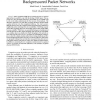Free Online Productivity Tools
i2Speak
i2Symbol
i2OCR
iTex2Img
iWeb2Print
iWeb2Shot
i2Type
iPdf2Split
iPdf2Merge
i2Bopomofo
i2Arabic
i2Style
i2Image
i2PDF
iLatex2Rtf
Sci2ools
112
click to vote
INFOCOM
2000
IEEE
2000
IEEE
Prevention of Deadlocks and Livelocks in Lossless, Backpressured Packet Networks
—When congestion builds up in a packet network, two general approaches are possible to cope with the shortage of buffer space. One approach is to drop incoming packets for which buffer is not available and to rely on the end-to-end protocols for the recovery of lost packets. The alternative approach is to insist that no packets should be dropped inside a packet network, even when congestion builds up. One way to accomplish this goal is to have the congested nodes send backpressure feedback to neighboring nodes, informing them of unavailability of buffering capacity and in effect stopping them from forwarding packets until enough buffer becomes available. While there are potential advantages in backpressured networks that do not allow packet dropping, such networks are susceptible to a condition known as deadlock in which throughput of the network or part of the network goes to zero (i.e., no packets are transmitted). In this paper, we describe a simple, lossless method of preventing ...
Backpressured Packet Networks | Communications | Incoming Packets | INFOCOM 2000 | Packet Networks |
| Added | 31 Jul 2010 |
| Updated | 31 Jul 2010 |
| Type | Conference |
| Year | 2000 |
| Where | INFOCOM |
| Authors | Mark J. Karol, S. Jamaloddin Golestani, David Lee |
Comments (0)

